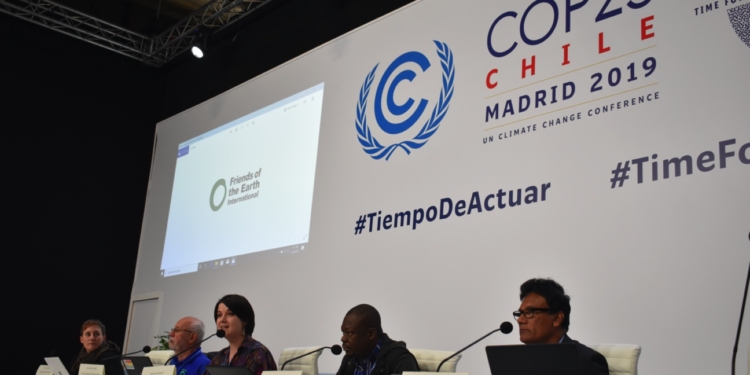As the 25th Conference of the Parties to the United Nations Framework Convention on Climate Change (UNFCCC) begins in Madrid the Spanish capital, civil society and grassroots groups have challenged Parties negotiating at the 11-day conference to heed the demands of climate-impacted people around the world to advance real and just solutions to address the climate crisis.
The groups that made the call include: Friends of the Earth International, Corporate Accountability and the Environmental Rights Action/Friends of the Earth Nigeria (ERA/FoEN), representing a broad spectrum of grassroots and climate justice movements.
In previous negotiations, countries of the Global North led by the United States (US) ensured that no meaningful advancements towards the real solutions were reached. They ensured that policy recommendations to insulate the negotiations from Big Polluters’ interference were shut down while discussions to place carbon markets at the center of Article 6 of the Paris Agreement threatened to derail real solutions including non market mechanisms.
While discussions at COP25 will focus on finalizing guidelines for Article 6, climate justice groups believe that Big Polluters are pulling out all the stops to embed dangerous and ineffective carbon markets that will unleash decades more of soaring emissions. They insist that this dangerous corporate agenda is backed by industry groups like the International Emissions Trading Association – one of the most influential trade associations pushing markets at the UNFCCC – representing BP, Shell and other Big Polluters.
Dipti Bhatnagar, Climate Justice and Energy Programme Coordinator for Friends of the Earth International, from Mozambique, said:
“Big polluters must be rubbing their hands in glee that carbon market mechanisms, which further dilute the already weak and inadequate Paris emissions targets, are back on the agenda. We will fight them tooth and nail. The climate crisis is already devastating lives. Emissions are still rising. Now is not the time to offer an escape route to polluting Northern country governments and big oil.”
She insisted that carbon markets fail to deliver emissions reductions or adequate climate action and impact horrifically on Indigenous Peoples and local communities.
Sriram Madhusoodanan, Deputy Campaigns Director, Corporate Accountability said:
“At COP25, governments must decide if the global response to the climate crisis centers real solutions or prioritizes more giveaways to the fossil fuel industry and other Big Polluters – especially those who have knowingly fueled this crisis for decades.”
“Instead of green-lighting the fossil fuel industry’s wish-list, governments must heed peoples’ movements around the world and advance real solutions, including opportunity to lay the groundwork for real, transformative pathways to 1.5 within Article 6.8. Pathways to real change that are made clear in the Peoples Demands – a set of demands issued to governments by hundreds of thousands of people, organizations, and peoples’ movements around the world”
Philip Jakpor of the Environmental Rights Action/Friends of the Earth Nigeria (ERA/FoEN) said:
“Within the Climate space, the promotion of carbon markets now poses the singular most dangerous distraction that has allowed Big Polluters and their allies to infiltrate the negotiation and steer delegates away from solutions. COP25 provides the opportunity for countries of the Global South to side with the millions of women, men, youths and vulnerable people that demand real Solutions.”
The groups believe that if there is no progress in the talks, the status quo would lock the world into decades more of soaring emissions, and frontline communities into further loss of life and livelihood.
They insist that at COP25, governments must clear a way forward for real solutions which will deliver real action, equity and ambition.
“Real solutions to the climate crisis and moving the negotiations forward lies in the people’s demands which outlines real climate solutions like an equitable managed decline of fossil fuels production, a just and equitable transition, real climate finance, and securing land and tenure rights for indigenous peoples and local communities”, the groups insist.

